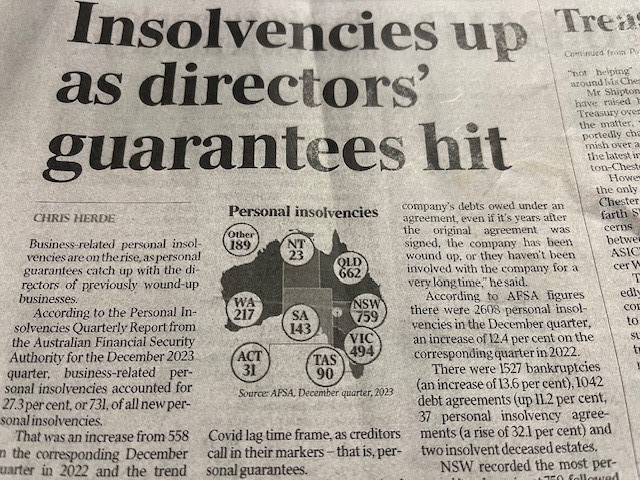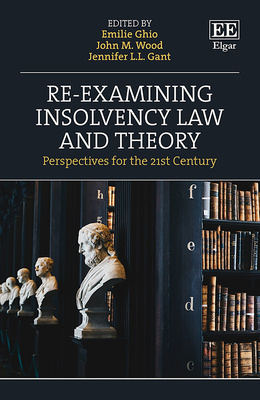
Some proposed personal insolvency reforms in Australia
With the federal government yet to respond to the PJC Report on corporate insolvency of July 2023, which recommended a general review of both personal

With the federal government yet to respond to the PJC Report on corporate insolvency of July 2023, which recommended a general review of both personal

The Senate Economics References Committee has issued its Report – Australian Securities and Investments Commission – investigation and enforcement, of 3 July 2024, which is

AFSA reports that “personal insolvencies increased in May 2024”. They did – by 3 more than in April 2024. Personal insolvency numbers increased by only

While the federal government is yet to give its response to the PJC Report on Corporate Insolvency of July 2023, there is little to suggest

The sentencing hearing in relation to former liquidator Mr Peter Amos was mentioned on 17 June 2024 and was then adjourned for a day’s hearing

The court hearing of an Australian bankruptcy trustee who may need to explain missing funds has been adjourned without ceremony to August 2024. Proceedings are

There is not much to report from the latest personal insolvency figures, save for continued small increases over time. It seems unlikely that personal insolvencies

While insolvency law uses many and varied terms to describe its various processes for dealing with an insolvent business, no fewer than six in the

Professor Jason Harris and I will be presenting a session at INSOL Academics Colloquium in San Diego USA on 22 May. Consistent with the theme

In response to the PJC Report, although a bit premature, ASIC is reviewing its RG 16, on offence reporting obligations, its consultation paper acknowledging many

By way of an update to this post, on 11 June 2024 the Federal Court adjourned the 14 June case management hearing in Leroy to

Justice John Logan of the Federal Court has raised some interesting issues in an otherwise straightforward bankruptcy judgment concerning the court’s ability to organise mental

A recent newspaper report on the trend of insolvencies in small business was interesting for the reason that it acknowledged that many or most businesses

The federal government has announced [1] that a compensation scheme for victims of financial services misconduct will start from 2 April 2024, including a Compensation

Updated on 5 March 2024 to refer to a 1996 Explanatory Memorandum in bankruptcy which says that, despite the case law, a person’s status as an

I am pleased to have been appointed by the government as a part‑time member to the Ministerial pool for the Corporate Insolvency Practitioner Registration and

Further to my comments of September 2023 below as to a review of the franchising code of conduct, that review has been completed and on

Offence referrals to ASIC by liquidators continue to be contentious and perhaps distracted by the issue of claimed automated decision-making by ASIC itself, although the

The registration of Australian bankruptcy trustee Mr Paul Leroy was cancelled by the Inspector-General in Bankruptcy (IGB) on 2 February 2024, effective from 5 February.

A recent book, Re-examining insolvency law and theory – perspectives for the 21st century, comprises chapters on a wide range of theoretical perspectives on insolvency

Numbers of personal insolvencies in Australia continue to fall with the December 2023 figure down to 805 compared with 853 in November 2023. However, December

Following the ALRC’s work on Ch 7 of the Corporations Act, attention has already been given to legislative changes tidying up the Act across a

Some years ago, I suggested to a Treasury officer that Ch 5 of the Corporations Act be redrafted and simplified. The curt response was, “you

On 7 December 2023, the government introduced legislation that would abolish the Administrative Appeals Tribunal (AAT) and establish what it terms “a new, fit-for purpose
Copyright 2022 Murrays Legal • Site design by Highland Creative